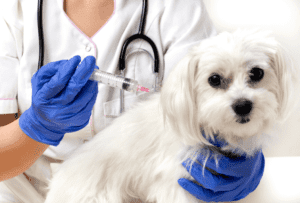Liver Disease in Dogs
Your dog’s liver is an important organ that has many jobs, and thus liver disease in dogs can have wide ranging effects on their health. The liver filters harmful toxins out of the bloodstream and can break down vitamins, supplements, and medications into forms readily usable by the body. The liver also helps with energy storage, creates factors that are responsible for the clotting of blood, and produces bile to help with the digestion of fats.
When there are problems with the liver, your dog might experience clinical signs like vomiting, diarrhea, loss of appetite, and weakness. You might also see a yellow tinge to the gums, eyes, ears, and skin. This is known as jaundice.
Severe liver disease can result in excess toxins in the bloodstream which can move to the brain and cause neurologic signs like seizures. In order to find an effective way to treat or manage cases of liver disease, it is important to first identify the cause.
How do I know if my dog has liver disease?
Inherited liver disease
If your dog is diagnosed with an inherited or congenital liver disease, then that means he was born with this illness. Some of these illnesses involve enzyme deficiencies that affect the way energy and minerals are stored in the liver. You might suspect that your puppy has one of these disorders if they are not gaining weight, lethargic, or having neurologic problems.

Portosystemic shunt is another kind of liver disease that can be inherited as a puppy or can be acquired as your dog gets older. A shunt refers to the formation of an extra blood vessel in the liver that isn’t a normal part of the liver’s blood circulation. Therefore, toxins and waste products are not filtered out of the body but instead go back into the bloodstream. This can cause vomiting, diarrhea, excessive thirst, fluid in the abdomen, and neurologic signs. Mild cases can be managed with supplements and medications that minimize these signs while severe cases may require surgery to close the shunt.
Liver disease caused by an infection
The liver can be acutely or chronically inflamed due to an infection. Viruses like adenovirus and herpesvirus cause clinical signs like lethargy and fever, and the virus can cause the death of liver cells. If enough liver cells die, then liver failure can occur.
Leptospirosis, which is a bacterial infection, is acquired from the urine, feces, and blood of an infected animal. The Leptospira bacteria can be contagious to other pets and people. Dogs with leptospirosis can have fever, lethargy, vomiting, diarrhea, and urinary problems. Without treatment, it can cause kidney and liver failure. There is a vaccine available for Leptospira, so make sure to talk to your veterinarian about it as part of your dog’s routine preventive care.
Liver disease caused by toxic substance
There are numerous products and medications that are toxic to dogs and can cause liver damage. Make sure to contact your veterinarian right away if your dog has ingested any of the following:
- Rodenticide
- Insecticide
- Herbicide or fungicide
- Cycad plants like Sago palm
- Heavy metals like zinc, silver, and copper
- Blue-green algae

If your dog has ingested any of these items, then your veterinarian might try to induce vomiting if the ingestion was within the last few hours. Your dog will also need medications to help prevent the absorption of the toxin plus fluid therapy and other supportive care.
Other conditions can increase the risk of liver disease
Certain disorders like diabetes and Cushing’s disease can increase the risk of liver disease. Dogs with diabetes are more likely to have inflammation of the pancreas, aka pancreatitis, and this can result in liver disease because of how closely the pancreas associated with the liver. For more information, check out our articles on Diabetes in Dogs and Pancreatitis in Dogs: Symptoms and How to Treat. Cushing’s disease is a condition when there is too much cortisol in the bloodstream, and this can cause acute liver failure if left untreated.
Liver cysts and cancer
Liver cysts and cancer can affect dogs of all ages. Liver cancer can be caused by a single tumor or multiple growths scattered throughout the lobes of the liver. In situations where cancer has originated in a different part of the body, the disease can spread to other body parts. This is known as metastasis. Treatment depends on the type of cancer present and might involve a combination of surgery, radiation, and chemotherapeutic medications.
During a routine physical examination, your veterinarian will palpate your dog’s abdomen to make sure everything feels soft and pliable. Abnormalities like liver enlargement, cysts, and tumors can sometimes be detected. Baseline blood work is important because certain enzymes may be elevated if liver disease is present. If your dog has elevated liver enzymes, then your veterinarian may recommend additional blood testing and/or imaging like x-rays or abdominal ultrasound. If a liver biopsy is recommended, then this involves collecting a small piece of the liver via ultrasound or surgery so that the liver can be analyzed and a more definitive diagnosis can be obtained.
Treatment and prevention of liver disease in dogs
Many of the diseases mentioned above cause long term inflammation (hepatitis) or other changes to the liver, forever affecting the way that it does its job. In order to boost the liver’s ability to carry out normal processes, your veterinarian may make several recommendations.
Prescription diets
Certain food companies make prescription diets for pets with liver disease. The diets are energy-dense and packed with antioxidants while minimizing the number of minerals like copper.

Medications and supplements
Supplements containing milk thistle and the ingredient SAMe (S-adenosyl-L-methionine) help boost the liver’s ability to perform various biochemical processes.
A medication called ursodiol is recommended for chronic hepatitis because it will decrease the number of liver enzymes in the blood.

Annual vaccines
Your dog should still receive annual vaccines unless he has an immune-mediated disease or has had a severe reaction to vaccines in the past. Vaccines protect against infection, and some infections can be more serious if a dog’s liver is compromised. Because certain medications rely on the liver in order to work, your dog will need to avoid them if he has liver disease.

Early detection and treatment can help minimize the long-term effects of liver disease
Liver disease can be difficult and very complicated. It is such an important organ because it is responsible for multiple functions, and other organs can be greatly impacted by a diseased liver. Early detection and treatment is key to recovery. A good diet, an ideal body weight, and routine veterinary care are all critical elements in keeping your dog healthy and happy.
Sources
Disorders of the Liver and Gallbladder in Dogs, Merck Veterinary Manual
The post Liver Disease in Dogs appeared first on VetBabble.




Post a Comment